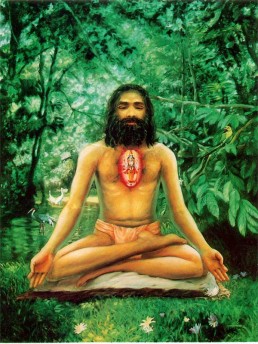Swami Chinmayananda Commentary
The other type, which makes a direct and immediate manifestation, in which the continuity of the past is clearly noticeable, is the theme of this stanza. Those who are pursuing selfless Upasanas, thereby gain more and more inner integration and as a result of it, they become dynamic minds capable of the highest meditation. The more integrated a personality, the more spiritual he becomes, and therefore, he must be given a chance to fulfil himself, not in heaven, which is a plane for enjoyment, but he must arrive right here to strive more diligently and achieve the highest. Such an ego-centre (Jeeva), as soon as it leaves one embodiment immediately comes to manifest itself in a conducive atmosphere, where it can continue its pilgrimage without any obstruction. It being an aspiring heart, it should necessarily come to be “BORN ONLY IN A FAMILY OF WISE-MEN-OF-MEDITATION.”
This theory gives a lot of insight into the present-day fallacy which gives such an exaggerated importance to one’s unhealthy environments and makes everyone protest against one’s surroundings. No doubt, in some ways man is a creature of his environments; but the same statement, when viewed through the glasses of philosophy, gives also an insight into the fact that the individuals, in their own freedom, had themselves ordered in the past their own present environments. By merely changing his environments, the individual concerned cannot progress; a habitual drunkard may still continue drinking on the sly, even if he were to be brought into a dry city to live among teetotallers.
Examples like Shankara, Christ, Buddha, and other great masters can be considered as supporting this philosophical theory. Such men of brilliant genius, who, from their very early youth, exhibit superhuman knowledge and Godly wisdom, are no doubt, rare. Krishna himself accepts here that such persons are “VERY RARE TO OBTAIN IN THIS WORLD.” If the previous stanza explained the re-birth of an ego (Jeeva) after an interval of existence in the heavens, this stanza explains the lives of the few, who, after departing from one embodiment, immediately arrive in this world to continue their pilgrimage to Perfection.
AFTER REACHING SUCH CONDUCIVE AND HELPFUL ENVIRONMENTS, WILL THE FALLEN YOGI OF THE LAST LIFE CONTINUE HIS SPIRITUAL LIFE? LISTEN:
Adi Sankara Commentary
Athava, or; bhavati, he is born; kule, in the family; dhimatam, of wise; yoginam, yogis; eva, only, who are poor-which is different from the family of the prosperous. Etat janma, such a birth; yat idrsam, as is of this kind-a birth that is in the family of poor yogis, in a family as described; is hi, surely; durlabha-taram, more difficult to get, as compared with the earlier one; loke, in the world. Becuase,
The Bhagavad Gita with the commentary of Sri Sankaracharya – Translated by Alladi Mahadeva Sastry
Holy Geeta – Commentary by Swami Chinmayananda
The Bhagavad Gita by Eknath Easwaran – Best selling translation of the Bhagavad Gita
The Bhagavad Gita – Translation and Commentary by Swami Sivananda
Bhagavad Gita – Translation and Commentary by Bhaktivedanta Swami Prabupadha
Srimad Bhagavad Gita Chapter 6 – Verse 42 – 6.42 athava yoginameva – All Bhagavad Gita (Geeta) Verses in Sanskrit, English, Transliteration, Word Meaning, Translation, Audio, Shankara Bhashya, Adi Sankaracharya Commentary and Links to Videos by Swami Chinmayananda and others – 6-42

